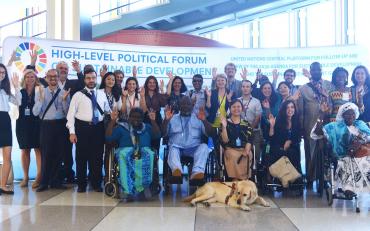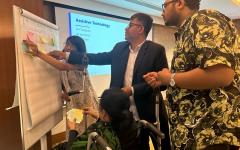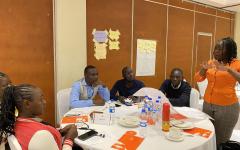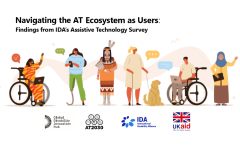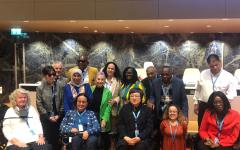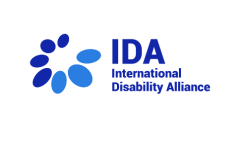In this edition:
I. Summary
II. Day by day at the HLPF
III. Ministerial Declaration
IV. Other news
V. Following the HLPF, go back to your government and build partnerships
VI. Representatives of the SGPwD share their perspectives on the HLPF
VII. Key resources
- Maria Soledad, UN’s Special Envoy on Disability and Accessibility, opening speaker at HLPF 2018.
- Mr. Idriss Alzouma Maiga, President of ADF and FOAPH, lead discussant, called on Member States to fulfil their commitments to the United Nations Convention on the Rights of Persons with Disabilities as they implement the 2030 Agenda during the panel on Least Developed Countries, Landlocked Developing States and Middle-Income Countries.
- The Stakeholder Group of Persons with Disabilities (SGPwD) delivered 6 interventions during the first week of HLPF.
- The Stakeholder Group of Persons with Disabilities delivered 5 statements on behalf of other stakeholders during the voluntary national reviews during the Ministerial week.
- During the 46 voluntary national reviews, 36 included references to persons with disabilities!
- The Ministerial Declaration was adopted with 3 important references to persons with disabilities, including in WASH.
- The SGPwD held an official side event on the inclusion of persons with disabilities in societies. The event addressed the implementation of Goal 11 for persons with disabilities by highlighting the importance of universal design, accessibility, accessible transportation, independent living and resilience.
- The Stakeholder Group of Persons with Disabilities had 31 participants attending the HLPF.
SUNDAY 8TH JULY
MGoS AND SGPwD HLPF PRE-MEETINGS
The Major Group and other Stakeholders (MGoS) HLPF Coordination Mechanism (CM), in partnership with UN DESA/OISC, held an HLPF pre-meeting on Sunday 9th of July at the Church Center, in New York, to help participants prepare and coordinate their engagement in the sessions and meetings of the HLPF. The Stakeholder Group of Persons with Disabilities led the work on the voluntary national reviews and delivered several presentations during the pre-meeting. Over 150 representatives of MGoS attended the meeting.
Following this meeting, the SGPwD delegation had a work dinner to go over the HLPF programme. Idriss Alzouma Maiga, President of the African Disability Forum (ADF) and of the West African Federation of Persons with Disabilities (WAFOD) gave opening remarks and welcomed the participants. 18 persons with disabilities and advocates attended the meeting.
MONDAY 9TH JULY, 2018
- OPENING: How far have we come on the SDGs? Ms. María Soledad Cisternas Reyes, UN Secretary-General’s Special Envoy on Disability and Accessibility Among the opening speakers!!!!
María Soledad Cisternas called on Member States to increase funding for the implementation of SDGs and to embrace human diversity. As such, she emphasized to take a human rights approach to implementation without leaving anyone behind. [Office1] Click here to read the full statement.
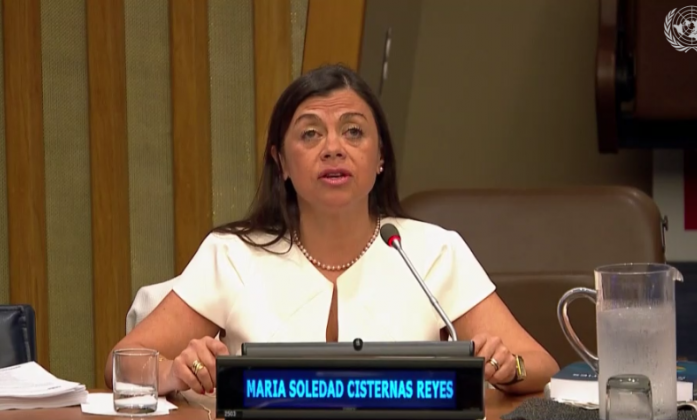
- THEMATIC DEBATE: Implementing the 2030 Agenda for resilient societies – Mr. Idriss Alzouma Maiga delivers first intervention by the SGPwD
During the morning session, Idriss Alzouma Maiga, representing the Stakeholder Group of Persons with Disabilities (SGPwD), and President of the FAOPH, delivered a speech emphasizing the lack of disability data. Idriss recommended States “to invest in high quality, timely, reliable and disaggregated data for reporting on the SDGs, and to foster global partnerships on data such as Together we count to be counted, to ensure evidence-based policy making”. “If we are not counted, we do not count and will be left behind”. The full speech was submitted to the UN and has been posted on the Portal Smart. Click here to read this prepared statement.
- REVIEW OF SDG IMPLEMENTATION: SDG 6 – Ensure availability and sustainable management of water and sanitation for all
The Women’s Major Group stated that “women with disabilities are impacted most when accessing water and Sanitation”.
During the afternoon session, Ndèye Dagué Guèye, representing the Stakeholder Group of Persons with Disabilities (SGPwD), Chair of Women’s Committee of the Senegalese Federation of Persons with Disabilities, was prepared to call upon member states “to ensure that persons with disabilities have access to clean water and sanitation by following the availability, quality, safety, acceptability, accessibility and affordability criteria followed with non-discrimination, participation, accountability, impact and sustainability and must be guided by universal design and broader scope of CRPD Article 9, including accessibility of information to ensure that all persons with disabilities are included.” Given time constraints and the limited slots available, she was not able to take the floor. The full speech was submitted to the UN and will be posted on the Portal Smart. Click here to read this prepared statement.
- OFFICIAL SIDE-EVENT: Stakeholder Engagement in the HLPF and its review in 2019
Mohammed Ali Loutfy, Representative of Disabled People’s International at the United Nations and Executive Director of the Arab Forum for the rights of persons with disabilities, represented the SGPwD in a side-event organized by the MGoS HLPF Coordination Mechanism and DESA-OISC on the 9 July 2018. Mohammed provided remarks on how stakeholder engagement can be more effective in the national, regional and global processes at the UN that lead up to the HLPF and what political messages should stakeholders be promoting. Click here to read more.
TUESDAY 10th JULY, 2018
- THEMATIC REVIEW: Transformation towards sustainable and resilient societies
Lan Anh Nguyen, from the Vietnamese Federation of the Disabled, stressed on behalf of the Stakeholder Group of Persons with Disabilities that “in order to achieve an inclusive, resilient and sustainable development for all, especially in poverty reduction, education, employment, health and gender equality, resilience-building of communities should ensure the equalisation of opportunities for full participation of persons with disabilities in all of their community activities”. Click here to read the full statement.
- THEMATIC REVIEW: Advancing science, technology and innovation for SDGs
On behalf of the Stakeholder Group of Persons with Disabilities, Peter Ochieng was ready to stress that “unless affordability and accessibility are guaranteed to ensure that assistive technology is available on an equal basis with everyone and everywhere, such benefits will remain a distant dream for 15 percent of the global population (for persons with disabilities)”. Given time constraints and the limited slots available, Peter was not able to take the floor. Click here to read this prepared statement.
- REVIEW OF SDGs IMPLEMENTATION: SDG 7 – Ensure access to affordable, reliable, sustainable and modern energy for all
On behalf of the Stakeholder Group of Persons with Disabilities, Idriss Alzouma Maiga wanted to recommend that “States must ensure universal access to affordable, reliable and efficient energy services for persons with disabilities, including the use of alternative energy facilities where warranted, limiting the frequency of power cuts”. Given the limited slots available, Idriss was not able to take the floor. Click here to read this prepared statement.
- SIDE-EVENT: Safer and inclusive roads and transports for cities that leave no one behind: How to ensure safe mobility for persons with disabilities and other vulnerable road user
On Tuesday at lunch time, Humanity and Inclusion, together with the Government of Belgium and the Government of Luxembourg, held a side-event entitled “Safer and inclusive roads and transports for cities that leave no one behind: How to ensure safe mobility for persons with disabilities and other vulnerable road user”. The event focused on the importance of safe and inclusive mobility to achieve sustainable development. The event was moderated by Eric Remacle, Road Safety Advisor, Humanity & Inclusion and a representative of the World Bank and featured the following speakers: H.E. Mr. Christian Braun, Ambassador, Permanent Mission of Luxembourg to the United Nations; Natalie Draisin, Director North American Office & United Nations Representative, FIA Foundation; Andre Dzikus, Coordinator, Urban Basic Services Branch, UN Habitat; Jean-François Gaillet, Director, Vias Institute (Belgium); Ndeye Dagué Gueye, Chair of Women Committee, National Association of Persons with Disabilities of Senegal.
WEDNESDAY 11TH JULY, 2018
- THEMATIC DEBATE: Transformation towards sustainable and resilient societies / SIDS perspective – SGPWD brings speaker from Solomon Island to address the session!
On behalf of the Stakeholder Group of Persons with Disabilities, Savina Daula’asi took the floor during the morning session to call on SIDS to “take steps to ensure active participation and leadership of persons with disabilities in all disaster risk management, planning, and implementation.” She added that “States should also incorporate universal design principles in ensuring that information, buildings, products and environments are inherently accessible from the outset.” Click here to read this prepared statement.
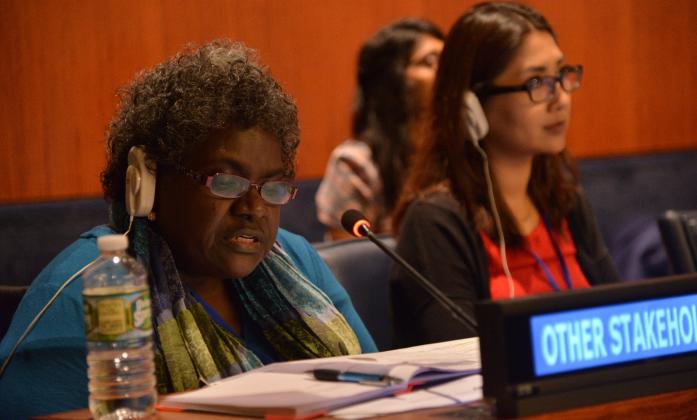
- THEMATIC DEBATE: Transformation towards sustainable and resilient societies / Perspectives of LDCs, LLDCs and MICs
On Wednesday morning, Idriss Alzouma Maiga participated as a lead discussant to the panel Perspectives of LDCs, LLDCs and MICs. Idriss delivered a strong statement on behalf of the SGPwD. He stated that States should “improve productivity, invest and guarantee inclusive, economic growth to overcome the marginalization of communities, including persons with disabilities”. Click here to read this prepared statement.
Download the power point presentation
- Review of SDGs implementation: SDG 11 – Make cities and human settlements inclusive, safe, resilient and sustainable
During the afternoon session, Ana Paláez Narváez delivered a statement on behalf of the SGPwD. She highlighted that “studies have indicated that persons with disabilities are four times more likely to die when a disaster strikes than those without disabilities.” She stressed the importance of applying universal design principles in order to make cities and human settlements “inclusive, safe, resilient and sustainable”. Click here to read this prepared statement.
- OFFICIAL SIDE EVENT OF THE STAKEHOLDER GROUP OF PERSONS WITH DISABILTIEIS: The inclusion of persons with disabilities in societies
On Thursday, at lunch time, the SGPwD, in partnership with UN Climate Resilience Initiative A2R, GAATES, Inclusion International, UKaid, EU, UNDP, CBM, HI, Global Resilience Partnership, World Enabled and EDF, organized a side event entitled: “Goal 11: Inclusion of persons with disabilities in societies”. The event was moderated by Mohammed Ali Loutfy and featured the following speakers: Jesús Orus Baguena, Team leader UN, Directorate General for International Cooperation and Development at the European Commission; Savina Nongebatu, Deputy Chief Executive Officer of the Pacific Disability Forum; Connie Laurin-Bowie, Executive Director at Inclusion International; Ndèye Dagué Guèye, Chair of Women’s Committee of the Senegalese Federation of Persons with Disabilities; Ana Paláez Narváez, Vice-President of the European Disability Forum and member of the CEDAW; and Angelika Planitz. Click here to download the flyer of the event.
- AT THE SAME TIME SGPwD speaks at a SIDE EVENT: Building inclusive and resilient cities in an ageing world – from words to action
The Stakeholder Group on Ageing organised a side event on Wednesday 11 July entitled: “Building inclusive and resilient cities in an ageing world – from words to action”. On behalf of the SGPwD, Lan Anh Nguyen provided remarks on how to make cities and human settlements inclusive, safe, resilient and sustainable. She stressed that many issues faced by older persons, women and girls, children and youth, indigenous peoples, migrants, and persons with disabilities are interlinked, and as such the overall objective is that we need to have a people-centred approach to urban development that includes all residents. Click here to read more.
THURSDAY 12 JULY,2018
- THEMATIC DEBATE: Implementing the SDGs: lessons from the regions
During the official morning session, Savina Daula’asi was prepared to present the Pacific Disability Forum SDG-CRPD Monitoring Report 2018 to the audience. Unfortunately, due to time constraints she was not able to take the floor. Click here to read the report.
- THEMATIC DEBATE: Transformation towards sustainable and resilient societies
During the official morning session, Ana Paláez Narváez highlighted the importance of collecting evidence-based data that are disaggregated by disability using the short set of questions developed by the Washington Group to inform policy makers, and to properly consult persons with disabilities and their representative organizations on the design, implementation and monitoring of SDG plans, in order to realize the inclusion for persons with disabilities in the society. "Safe and inclusive mobility is central for guaranteeing persons with disabilities participation in the life of their communities". Click here to read this prepared statement.
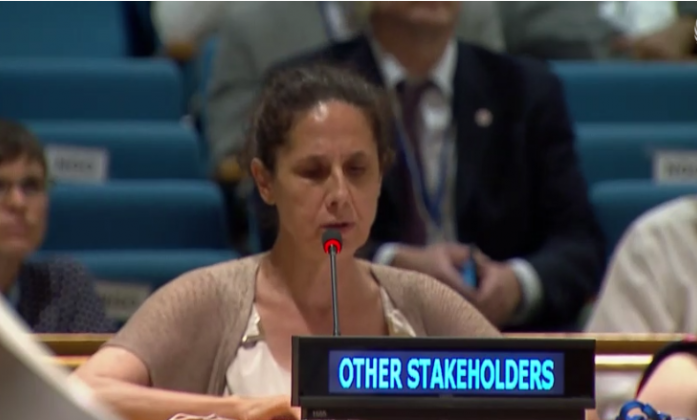
FRIDAY 13 JULY, 2018
- LEAVING NO ONE BEHIND: ARE WE SUCCEEDING?
During the afternoon session, Ndèye Dagué Guèye highlighted that it is of “upmost importance that international and national aspirations are linked. Advocacy at the global level for the collection and disaggregation of disability data is not enough unless international-level commitments are translated into national priorities and realities”. Click here to read this prepared statement.
SATURDAY 14TH JULY, 2018
- A4SD WORKSHOP : “RESILIENT SOCIETIES, RESILIENT PEOPLE: INCLUSION OF CIVIL SOCIETY IN THE 2030 AGENDA”
On Saturday 14th July, Idriss Alzouma Maiga, representative of the Stakeholder Group of Persons with Disabilities and President of the African Disability Forum (ADF) and of the West African Federation of Persons with Disabilities (WAFOD), sat on a panel titled: “Resilient Societies, Resilient People: inclusion of civil society in the 2030 Agenda”. Idriss introduced the DPOs written Niger’s SDG implementation report which contains a number of recommendations for the government on how to achieve the SDGs for persons with disabilities. In addition, Idriss emphasized the importance of inclusion of persons with disabilities and elaborated on the difference between NGOs and DPOs. Click here to read the report.
MINISTERIAL WEEK OF HLPF: VOLUNTARY NATIONAL REVIEWS
The Voluntary National Reviews (VNR) started after the Opening of the High-Level Segment (Ministerial Segment). Throughout the 3 days, out of 46 Voluntary National Reviews 36 had a reference to persons with disabilities, either highlighted by Governments or through questions asked to reflect and address the situation of persons with disabilities in their respective countries.
Members of the Stakeholder Group of Persons with Disabilities (SGPwD) were actively engaging in drafting the collaborative civil society statements, their negotiated with other civil society representatives the content of the statements and ensured important points referencing persons with disabilities were included. Five civil society statements with questions were delivered by the SGPwD.
- During the Albania-Latvia-Sudan-Niger VNR segments, Idriss Alzouma Maiga asked the Government of Niger: “What steps will Niger take to ensure the CSO participation in all their diversity, including organizations of women, youth and persons with disabilities within the national reviews and evaluation of all development programs, in line with national and international legal and regulatory instruments? Will states commit to increasing budgets to support the most-vulnerable populations?”. Click here to read the collective statement with questions.
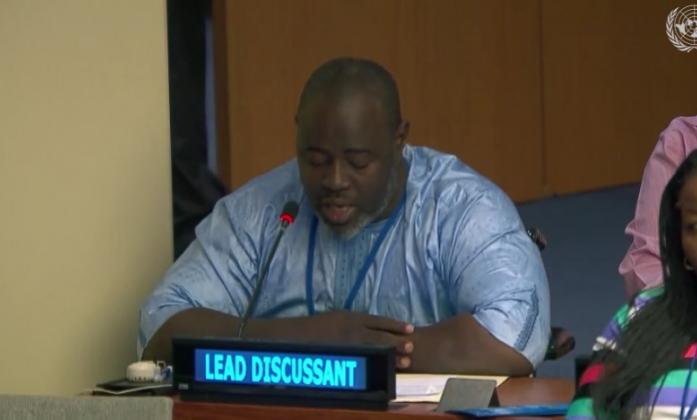
- Alexandre Bloxs, EDF, asked in International Sign the Government of Namibia: “how does Namibia commit to carry out Article 5 of the UN Convention on the Rights of Persons with Disabilities that all persons are entitled to equal protection and equal benefit of the law?” Click here to read the full statement.
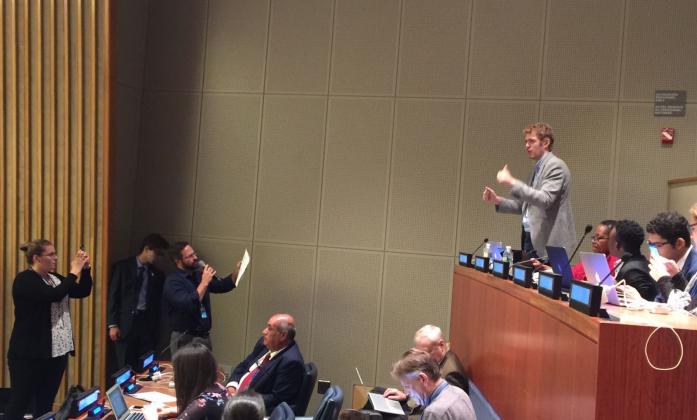
- Ana Paláez Narváez, Vice-President of the European Disability Forum and member of the U.N. Committee on the Elimination of Discrimination against Women (CEDAW), asked the Government of Greece: “It is highly important to have reliable, strong and accurate data. Could you elaborate on your strategy, in collaboration with your National Statistical Office, to collect data disaggregated by age, gender and disability?” Click here to read the full statement.
- Ana Paláez Narváez asked three questions related to disabilities to the Government of Switzerland: “How is Switzerland guaranteeing an inclusive and participatory process for the future Agenda 2030 process, that includes all, also persons with disabilities and sign language users?”; “How will the government tackle the much larger gap as compared with neighboring states with regard to the real life situation and specific needs of persons with disabilities, such as physical and societal barriers, the non-existence of communication access in sign language, which is a prerequisite to participating in social and political processes, etc?”; “Will the Swiss Federal Administration systematically collect data disaggregated by different types of disabilities as required by the CRPD?” Click here to read the full statement.
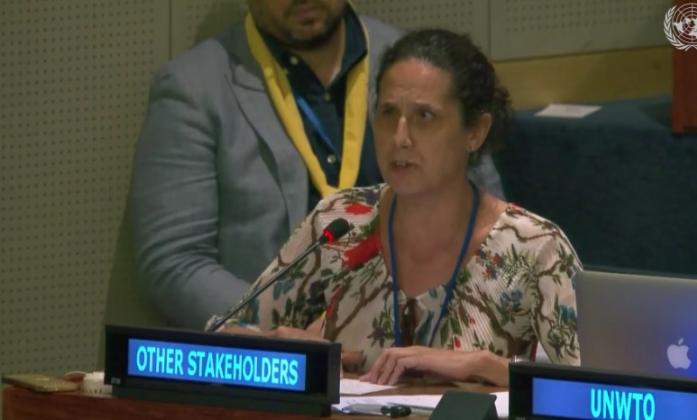
- Mohammed Loutfy, Representative of Disabled People’s International at the United Nations and Executive Director of the Arab Forum for the rights of persons with disabilities, asked the Government of Lebanon: “What measures Lebanon will take to ensure transparent and inclusive monitoring and implementation of the Agenda 2030?” Click here to read the statement with questions.

- Megan Smith, IDA asked the Government of Malta: “What is being done to make sure that Malta provides universal access to persons with disabilities? What do you do to ensure persons with disabilities do not fall into the poverty trap?” Click here to read the statement with questions.
CAUCUS-MEETING OF THE STAKEHOLDER GROUP OF PERSONS WITH DISABILITIES
On Tuesday 17 July, in margin of the High Level Political Forum, the SGPwD held a Caucus Meeting at the UN in New York. 15 persons attended. Newcomers shared their thoughts on the HLPF process and the inclusion of persons with disabilities. Some participants were extremely grateful for the opportunity to be present at the forum and advocate for persons with disabilities, though they acknowledged that inclusion of persons with disabilities could be improved in terms of accessibility at the UN and within different meetings. Stakeholder group members who have previously attended HLPF stressed the importance of the involvement of persons with disabilities in decision making and advocacy at the United Nations in addition to involvement at the national and subnational levels. Some of the challenges identified in the meeting included the inclusion of persons with disabilities at the UN, the gaps and challenges to address the rights of persons with disabilities in national policies and throughout the implementation of the SDGs, and persons with disabilities also emphasized the difficulties to access information, in particular with regards involvement in the implementation of SDGs. Collaboration and partnership have been identified as key strategies for moving forward. In the words of one member of the Stakeholder Group of Persons with Disabilities, "The work is not yet finished. There is still much to do once we arrive back at home. Take lessons that you have learned [at HLPF] to enhance your advocacy work in your country."
This year, the very first time, the Ministerial Declaration was NOT adopted by consensus but by vote. The United States requested a vote on the entire document, because it has highly criticised the paragraph on trade among others. As an explanation after the vote a very large number of Member States expressed concern with regards the adoption process. This signals that the implementation of the 2030 Agenda, the SDGs in particular is not not on track neither in line with Member States priorities.
The Ministerial Declaration is the outcome document of the HLPF and contains overall recommendations as well as specific ones regarding the goals under review. The Stakeholder Group of Persons with Disabilities participated in all the Ministerial Declaration negotiations and has delivered 3 interventions requesting the inclusion of persons with disabilities in the text. As a result the final version of Declaration contains 3 very good references to persons with disabilities, which are:
- In the paragraph leave no one behind (11) :
“….Those whose needs are reflected in the 2030 Agenda include all children, youth, persons with disabilities (of whom more than 80 per cent live in poverty)…”
- In the paragraph on data (18) :
“….We urge countries to further strengthen collaboration at the bilateral, regional and global levels for capacity-building and sharing of best practices for collecting, producing, disseminating, analysing and using quality data and statistics, disaggregated by income, sex, age, race, ethnicity, migration status, disability, geographical location…”
- In the paragraph (23) on WASH:
“…In particular, we must pay special attention to ensuring access to sanitation and hygiene facilities, taking into account the specific needs of women and girls, for menstrual hygiene management, and for persons with disabilities, without compromising their safety and dignity…..”
The full version can be found here.
- Idriss Alzouma Maiga, President of FOAPH and ADF, and Siddo Oumarou Manou, President of FNPH, shared with H.E Ms. Kané Aichatou Boulama, Niger Minister of Planning, their report on the implementation of the SDGs in line with the CRPD. This report has been produced in partnership with the African Disability Forum and IDA as part of the DFID project. More information available here.
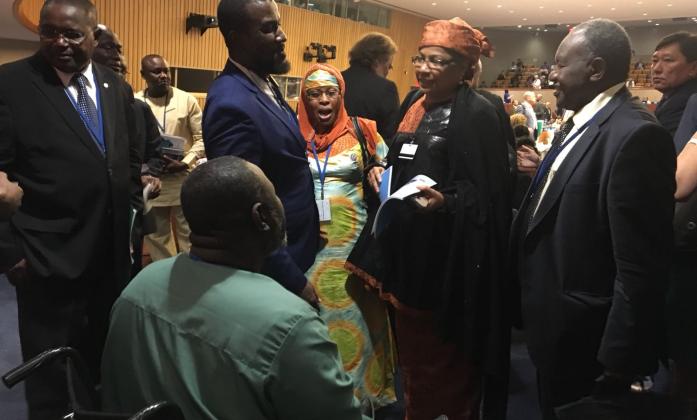
- Following the Lebanon VNR, Mohammed Loutfy, Representative of Disabled People’s International at the United Nations and Executive Director of the Arab Forum for the rights of persons with disabilities, met Ghasan Hasbani Deputy Prime Minister and Minister of Public Health of Lebanon.
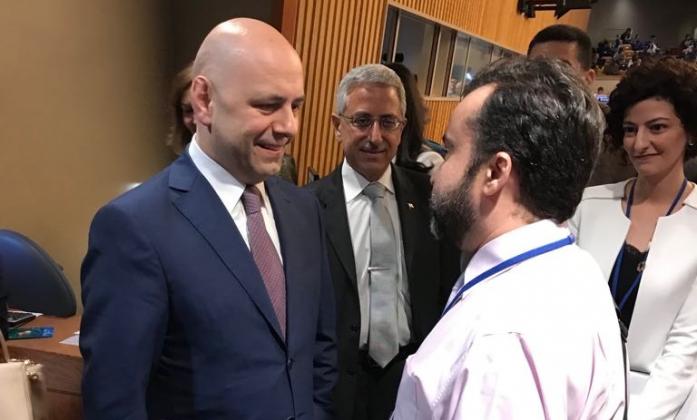
V.FOLLOWING THE HLPF, GO BACK TO YOUR GOVERNMENT AND BUILD PARTNERSHIPS
Prior to HLPF, independent of the country’s internal political system, the global process/HLPF reporting triggers a national consultation based on a dialogue between the government and civil society. For many countries, this is a unique opportunity to engage with the government and can create opportunities in the current political atmosphere. It is largely the responsibility of civil society, including DPOs, to remind political leaders that this is not a one-time obligation, but should be an ongoing permanent dialogue. It may be challenging in some countries to establish a follow-up mechanism on international commitments, while in other countries it may naturally flow. The objective of DPOs should be to engage in the follow-up mechanisms / HLPF outcomes to seek direct communication with the Ministry that presented the SDG implementation action plan during the HLPF.
After the VNR concludes at the HLPF, it is highly critical to follow-up to assess outcomes at the national level. Currently, many countries are satisfied with the outcomes of the global review without any follow-up mechanisms. Not all countries have such a follow-up mechanism in place, but it is important to highlight that this the responsibility in part of the national civil society to push their governments to continue and maintain a dialogue/conversation. The national follow-up mechanism should not be a “blaming-or-shaming” session, but rather a constructive approach to address issues raised in the global-level review process, or issues that have been left out.
The participation of DPOs in the entire VNR process is to enable persons with disabilities to enhance and broaden their advocacy efforts with their governments at the national level. The entire global reporting mechanism, VNR, serves the one and only purpose to foster periodic dialogue between the government and its people.
How to initiate and participate in a follow-up process after the HLPF at the national level:
- If relevant, watch your country’s review on UN web tv and analyze the submissions (short and long) written reports. On the basis of this analysis, prepare your paper highlighting that issues addressed and left out.
- Find out if there is any follow-up on HLPF dialogue planned by your government.
- Reconnect with civil society and propose to establish a follow-up mechanism.
- Contact and arrange meetings with the Ministry/Minister who presented at the HLPF.
- Advocate to establish synergy with other existing national follow-up or review mechanisms, such as national consultations on the SDG implementation plan and national human rights review mechanisms.
- Propose a partnership to your government and consider engaging with the IDA and IDDC Partnership on SDGs.
If you are from one of the 46 countries that have reported, you are recommended to watch the national presentations linked below. Each video has captioning and International Sign.
- Ecuador- Kiribati- Lithuania- Mali:
- Greece-Guinea-Mexico- UAE
- Benin- Cabo Verde- Bahrain- Colombia- Slovakia- Viet Nam
- Albania- Latvia- Niger- Sudan
- Armenia- Ireland- Jamaica- Namibia- State of Palestine
- Bhutan- Togo- Australia-Sri Lanka- Switzerland- Uruguay
- Andorra- Dominican Republic- Canada- Egypt – Lao PDR- Senegal
- Bahamas- Hungary- Lebanon- Malta
- Poland- Romania- Saudi Arabia- Singapore- Spain
- Congo- Paraguay- Qatar
VI. REPRESENTATIVES OF THE SGPWD SHARE THEIR PERSPECTIVES ON THE HLPF
- Click here to watch the live interview of Savina Daula’asi on IDA Facebook!
- Click here to watch the live interview of Mohammed Loutfy and Jose Maria Viera on IDA Facebook!
- Click here to watch the live interview of Hatouma Gakou on IDA Facebook!
- Click here to watch the live interview of Idriss Alzouma Maiga and Siddo Nouhou Oumarou on IDA Facebook!
- Click here to watch the live interview of Ana Paláez Narváez on IDA Facebook!
***
